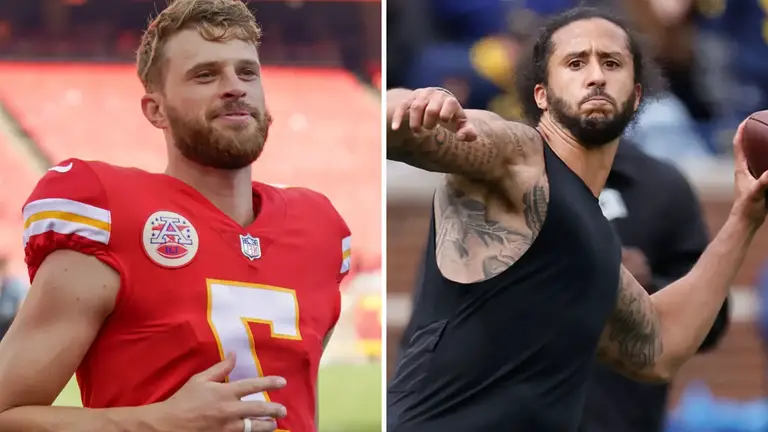In a landscape where sports and politics often intertwine, the words of NFL kicker Harrison Butker resonate with clarity and conviction. Recently, Butker made headlines with a statement that contrasted sharply with the actions of former quarterback Colin Kaepernick, who ignited a national conversation on social justice and the right to protest. Butker’s declaration, “I will always stand when I hear our national anthem,” reflects his personal beliefs and the values he upholds as an athlete and an American.
A Personal Stand
For many athletes, the national anthem represents not just a moment of respect for their country, but also an opportunity to reflect on the ideals of freedom and unity. Butker, known for his key role in the Kansas City Chiefs’ recent successes, emphasized that standing during the anthem is a way to honor those who have served and sacrificed for the nation. He articulated his view that the anthem serves as a reminder of the struggles and triumphs that have shaped America.

Butker’s remarks come at a time when the NFL has faced significant scrutiny over player protests during the national anthem. Kaepernick’s decision to kneel in 2016 sparked widespread debate about racial injustice, police brutality, and the role of athletes in societal change. While Kaepernick’s actions were rooted in a desire to bring attention to pressing issues, Butker’s stance highlights a contrasting perspective that emphasizes patriotism and respect for the national symbols.
The Broader Context
Butker’s comments can be understood within the broader context of the NFL’s evolving relationship with social issues. The league has seen a shift in how players express their beliefs, with some choosing to use their platforms for activism, while others prefer to maintain a more traditional approach. This divide raises important questions about the role of athletes in society and the ways in which they can influence change.
While Kaepernick’s kneeling was a form of peaceful protest, it was met with both support and backlash. Many fans and players viewed it as a necessary stand against injustice, while others saw it as disrespectful to the flag and the anthem. Butker’s affirmation of standing during the anthem suggests a desire to bridge this divide, promoting dialogue rather than division.
Emphasizing Unity and Respect
In his statement, Butker also emphasized the importance of unity and respect in the face of differing opinions. He acknowledged that while people may have different perspectives on how to address social issues, there is a shared responsibility to foster understanding and respect among one another. This sentiment underscores the need for constructive conversations about race, equality, and justice in America.
Butker’s approach aligns with a growing call among athletes to engage in discussions about social justice while also honoring their country. By standing during the anthem, he seeks to demonstrate that it is possible to be both patriotic and socially aware. This duality reflects a nuanced understanding of the complexities surrounding national identity and activism.
A Call to Action
As the conversation around the national anthem and athlete activism continues to evolve, Butker’s words serve as a reminder of the diverse views that exist within the sports community. His commitment to standing during the anthem is not merely a personal choice but a call to action for others to engage in dialogue and reflect on their own beliefs.
In the NFL, where the spotlight shines brightly on players both on and off the field, Butker’s stance can inspire a new generation of athletes to consider how they wish to express their values. Whether through standing, kneeling, or engaging in community service, athletes have the power to shape conversations and drive change in meaningful ways.
Conclusion
Harrison Butker’s declaration to stand for the national anthem stands in contrast to Colin Kaepernick’s legacy of protest, yet both serve as important narratives in the ongoing dialogue about race, justice, and patriotism in America. As the nation grapples with its identity and the values it holds dear, the perspectives of athletes like Butker and Kaepernick remind us that there is no singular way to express love for one’s country or advocate for change. In a world that often feels divided, finding common ground through respectful dialogue and understanding may just be the path forward.




